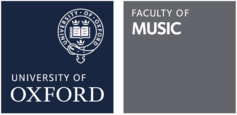Oxford Seminar in Music Theory and Analysis: New Voices in Musico-Poetics
Curated and chaired by Chloe Green (University College, Oxford)
'Transforming Early Greek Lyrics'
Michael Parsons
'Musico-Poetics in Cross-Cultural Perspective: The 'China-Europe-Japan’ Triangle''
John Lam
‘A Larger Context for Ockeghem’s ‘Petite Camusette’
Jane Alden
Abstracts
'Transforming Early Greek Lyrics'
Michael Parsons
Michael Parsons was a classical scholar at St. John's College Oxford (1957-61), and went on to study composition at the Royal College of Music in the 1960s. After thirty years of involvement in experimental and avant-garde music, he rediscovered his earlier interest in Ancient Greek literature, with settings of choruses from Greek tragedy and lyrics by Sappho, Alkman, Bacchylides, Pindar and others. The music of these settings, although closely related to the metrical and accentuation patterns of the original texts, is not intended to imitate or restore characteristics of Ancient Greek music. It aims rather to transpose the lyrics into a different context and to suggest their continuing interest and relevance. The lyrics are reinterpreted in the light of the polyphonic and harmonic resources of European music since the Renaissance. Michael Parsons will discuss his approach to Ancient Greek texts, with reference to the changed context in which they are represented.
'Musico-Poetics in Cross-Cultural Perspective: The 'China-Europe-Japan’ Triangle''
John Lam
Around 1900, European chinoiserie and japonisme manifested in both literary and musical endeavours. Translation, adaptation and interpretation of East-Asian poetry paralleled incorporation and transformation of what European composers perceived as sounds of the faraway lands. These two experiments intersected in a new repertoire of songs, contributing to the cultural dimension of musico-poetics. Uncovering modernist approaches to pitch organisation, specifically (an)hemitonic pentatonicism, in selected songs, this talk presents preliminary findings of an ongoing project on musical modernity across the ‘China-Europe-Japan’ triangle. Contrary to prevailing tendencies to ‘provincialise’ Europe by downplaying or even evading Eurocentric viewpoints, the triangular conceptual model decentres European schools of thought by rendering Europe neither as a starting point nor a destination, but as one of the many ‘stations’ of cultural flow and an unique angle into intra-Asian spheres of knowledge co-production.
‘A Larger Context for Ockeghem’s ‘Petite Camusette’
Jane Alden
In the world of Old French fabliaux, a trouvère or chanteur shares etymological roots with a vagabond or brothel keeper. Such slippery meaning is significant for those whose art relies on musical wit. Charles Muscatine discerns “a stratum of sensibility” in fabliaux that permeates other strata of medieval society. This is the context in which I investigate S’elle m’amera/Petite camusette, a combinative chanson by the fifteenth-century French court composer and treasurer Johannes Ockeghem. The top voice, in rondeau form, declaims the standard courtly literary trope of unrequited love, while the lower three voices address “Little snub-nose” directly, recalling the moment of (euphemistic) death.
Whereas most composers of combinative chansons differentiate between the “courtly” and “popular” styles, Ockeghem’s top voice, singing the rondeau text, resembles and anticipates the “chanson rustique.” What seems hitherto not to have been noticed is that the rondel’s central lines reference Adam de la Halle’s Jeu de Robin et Marion. Is this the mythological knight intruding upon the amorous pastoral couple? It depends how we interpret the “petite camusette,” little snubnose.
In this presentation, I situate Ockeghem’s poetic othering within an extensive literary and musical lineage. Ambiguous where we might expect clarity, Ockeghem traverses poetic registers in ways that defy our musical expectations.
Season 7 of OSiMTA marks a change in format from the first six seasons. In place of twice-termly meetings with one invited speaker, sessions will take place once a term with a larger number of position papers and responses around a focused theme, in order to encourage greater engagement and discussion. We are calling these seminars New Voices in Music Analysis, and each session will be curated by one of the latest generation of Oxford researchers in music theory and analysis.
The sessions will take place as follows:
Michaelmas Term 2024: Tuesday 19 November (6th week), 17.00–19.00, New Directions in Topic Theory, curated by Dr James Donaldson (Magdalen College, Oxford).
Hilary Term 2025: Tuesday 11 March (8th week), 17.00-19.00, New Voices in Musico-Poetics, curated by Chloe Green (DPhil candidate, Somerville College, Oxford)
Trinity Term 2025: date tbc, Scenes from Childhood: Music Theory and Analysis, Education and Play, curated by Dr Giles Masters (Magdalen College, Oxford)
The Oxford Seminar in Music Theory & Analysis (OSiMTA) was established in 2018 and is convened by Dr Esther Cavett and Professor Jonathan Cross.
Our conception of theory and analysis is critical, plural and interdisciplinary. In shaping the seminars, we always aim to reflect the broad range of activity taking place under the heading of theory and analysis today, as well as to challenge boundaries, embracing not only ‘conventional’ practices, histories of theory and repertoires, but also new interdisciplinary approaches that engage with cultural studies, ethnomusicology, aesthetics and philosophy, psychology, politics, performance studies, popular music studies, and so on. Speakers include distinguished local, national and international scholars.
Seminars are open to all, including the general public. Sessions this year are likely to last two hours, where lively discussion will be encouraged. Stay for drinks and join us afterwards for dinner in a local restaurant.



